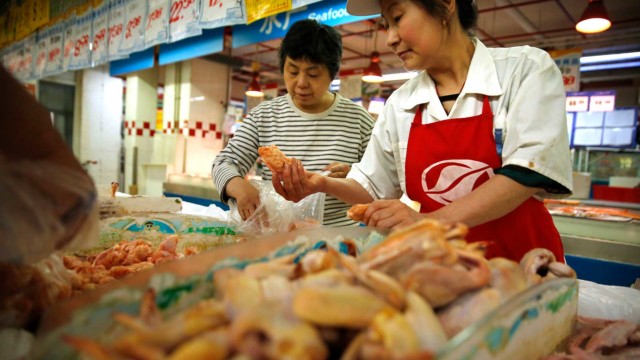Beijing will open its borders to U.S. beef, while cooked Chinese poultry is closer to landing on American supermarket shelves under a U.S.-China trade agreement.
Trump administration officials hailed the deal as a significant advance toward boosting U.S. exports and closing America’s trade gap with the world’s second-largest economy. U.S. trade experts offered a more muted assessment, calling the agreement a modest fulfillment of past assurances made by China.
China just agreed that the U.S. will be allowed to sell beef, and other major products, into China once again. This is REAL news!
— Donald J. Trump (@realDonaldTrump) May 12, 2017
Among other things, the deal enables U.S. companies to export liquefied natural gas to China. It will also lower long-standing barriers that have affected matters ranging from agriculture to the operation of American financial firms in China.
Commerce Secretary Wilbur Ross hailed the agreement, coming on the heels of President Donald Trump’s April meeting with President Xi Jinping, as “a herculean accomplishment.”
“This is more than has been done in the whole history of U.S.-China relations on trade,” Ross told reporters Thursday evening at the White House.
In Beijing, Vice Finance Minister Zhu Guangyao told reporters the early results of the agreement showed that economic collaboration between the two sides “couldn’t be closer.”
It remains unclear how far China will go to allow more American exports. Previous administrations have hailed market-opening agreements only to be left disappointed.
Trump made America’s wide trade deficits and especially the gap with China a major issue in his campaign and during the early days of his administration. He’s argued that America’s perennial trade gaps have cost millions of factory jobs and he has pledged to take a tougher stance in trade negotiations to lower the imbalances.
Under the agreement, the United States is inviting Chinese companies to import U.S.-produced liquefied natural gas. The Energy Department has authorized natural gas shipments of 19.2 billion cubic feet per day to China and other interested countries that lack a broader free trade agreement with the United States, the Commerce Department said.
China is turning more to natural gas as a way to reduce its dependence on coal and combat the country’s extensive air pollution. The move would allow China to diversify its supply and provide a major market for American suppliers, though the expansion could lead to higher prices for U.S. consumers.
The agreement would also ease import restrictions on agricultural goods, including ending China’s ban on beef imports, which was imposed in 2003 after a case of mad-cow disease. In exchange, the U.S. would allow the sale of cooked Chinese poultry — a move Ross said could be done safely.
The agreement would also streamline the evaluation of U.S. biotechnology product applications; pave the way for allowing American-owned suppliers of electronic payment services to begin the licensing processes in China; and facilitate the entrance of Chinese banks into the U.S. banking market.
The agreement grew out of negotiations the countries agreed to start after Trump’s meeting at his Mar-a-Lago estate with the Chinese president.
America’s trade deficit in goods and services with China totaled $310 billion last year, by far the largest imbalance with any country.
The two countries have also agreed to hold talks this summer to be led by Ross, Treasury Secretary Steven Mnuchin and Vice Premier Wang Yang to work on a one-year plan.
Story by The Associated Press
 CGTN America
CGTN America
 A clerk, right, helps a woman shop for chicken at a supermarket in Beijing, Friday, May 12, 2017. China will finally open its borders to U.S. beef while cooked Chinese poultry is closer to hitting the American market as part of a U.S.-China trade agreement. (AP Photo/Mark Schiefelbein)
A clerk, right, helps a woman shop for chicken at a supermarket in Beijing, Friday, May 12, 2017. China will finally open its borders to U.S. beef while cooked Chinese poultry is closer to hitting the American market as part of a U.S.-China trade agreement. (AP Photo/Mark Schiefelbein)
